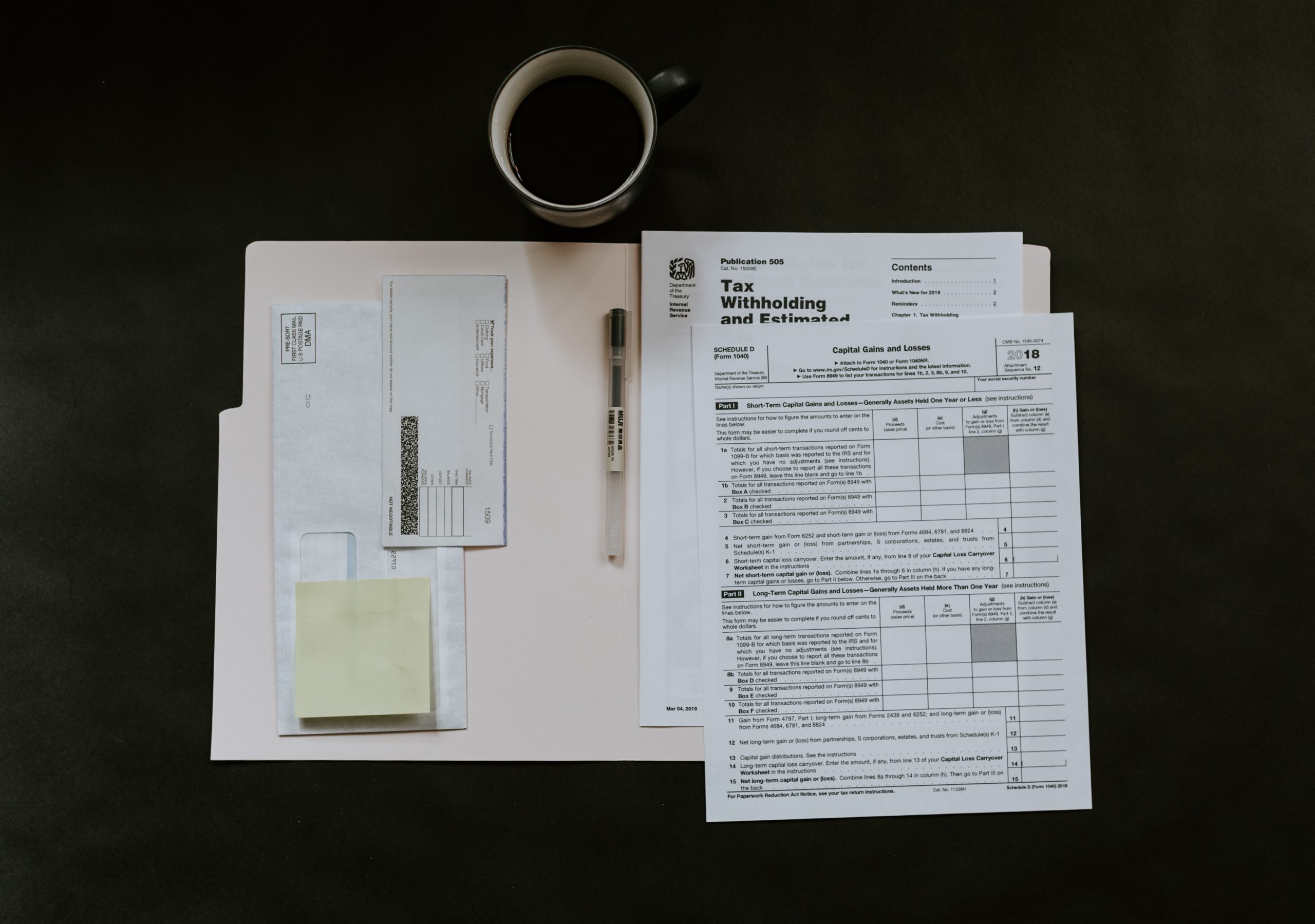There are a lot of appealing benefits of owning rental property, including producing rental income and accessing long-term capital appreciation. Being a landlord can also come along with a number of tax benefits, including allowing you to deduct the depreciation of the building from your taxable income. What happens to depreciation when you sell a rental property, though?
If you’re planning on selling a rental property, it’s important to understand the tax implications connected with the transaction. Basically, the IRS requires that you pay a depreciation recapture tax regardless of whether or not you claimed the depreciation deduction on your taxes while the rental was in operation.
Luckily, you might be able to defer or potentially even eliminate having to pay this tax.
Let’s take a look at what you need to know about depreciation deductions, recapture taxes, and other taxes associated with the sale of a rental property.

Did you know that you can claim depreciation on your rental property even if the value of the property has gone up since you bought it? The depreciation you claim only refers to the building itself, not the land that it’s on, and it only exists on paper for the IRS.
The term depreciation refers to how much of an asset’s value has been used. Over time, assets are typically depreciated because new assets are commonly more valuable than older assets. Depreciation, then, serves as a way to measure the loss of value an asset incurs over a period of time.
This can occur both directly and indirectly. It can happen directly through wear and tear from ongoing usage, and indirectly from factors like inflation and the introduction of newer models of the asset.
Real estate depreciation is a tool that allows rental property owners to lower their taxable income. Since you can only claim depreciation deductions from the value of buildings and not land, you’ll need to determine what the value of the building is alone.
You’ll want to take a look at your latest appraisal or tax bill in order to get a sense of how much of the value of your property is in the land itself. The average amount of a property’s value that is attributed to the land, though, is about 20%.
This information is worth tracking down because it can vary quite a bit between properties. For example, let’s say that you purchased a property with a house on it for $250,000. On the tax bill, you can see that 20% of the home’s value is in the land itself.
What this means is that the land is worth $50,000 and the depreciation cost basis is $200,000. (The cost basis is the land’s value subtracted from the cost of the home, plus any additional value you have added through improvements.) You are only allowed to depreciate the building itself, not the land.
Property can be depreciated once you “place it in service.” Basically, if you buy a property but it takes you a while to renovate and market it to potential renters, depreciation can’t start until you have begun that marketing process. You don’t have to have found tenants in order to start depreciating, but you do have to have started the search for renters.
When you determine the depreciation of your rental, you are doing so over its useful life. According to the IRS, this is 3.63% of the annual cost basis over the course of 27.5 years. As a part of calculating your depreciation, you can’t include the rent that was paid before the closing, the cost incurred in getting the loan, or fire insurance premiums.
(Are you wondering how to calculate property value based on rental income? If so, check out this article.)
Your tax liability is lowered for each tax year that you own your rental property through the depreciation deduction. This means that you receive a tax write-off every year that you own your investment property. However, you will have to pay depreciation recapture tax when you end up selling the property.
You might think that it could be advantageous to not take the depreciation deduction in order to avoid the depreciation recapture tax. However, you will actually have to pay this tax regardless of whether or not you claimed depreciation when you did your taxes. For this reason, it pretty much always makes sense to claim the depreciation deduction whenever you are eligible for it.
On any depreciation you claimed or could have claimed, you’ll owe 25% plus state income tax or your current tax bracket, whichever is less.
If you sell the property for a loss, however, you won’t have to pay the depreciation recapture tax. For example, if you own a rental property and you can no longer afford to keep the home despite a dramatic drop in market value, you might decide to sell it. In this case, you won’t be responsible for the recapture tax and you can claim a loss on your taxes.
In order to best describe how to calculate rental property depreciation recapture, we’ll look at a simple example. Let’s say that you purchased a rental property ten years ago for $250,000. When you bought the property, the tax assessor determined that the land was worth $50,000.
In order to find the cost basis, you will subtract the value of the land from the cost of the property, leaving you with $200,000 in this example. This is how much can be used to claim a depreciation deduction on your taxes.
In this example, you’ve owned the property for ten years. Let’s say that you claimed $7,260 in the form of a depreciation expense each year. This means that your total depreciation expense would be the product of $7,260 times ten years, or $72,600.
Over the time period, you owned the property, the amount of taxable net income that you were required to pay to the federal and state government was reduced through your depreciation deduction. However, the IRS is going to want that money back when you sell the property through depreciation recapture.
The total depreciation deduction will be taxed at your typical income rate with a maximum rate of 25%. For example, let’s say that your normal tax bracket as a single filer is the 24% tax rate bracket. This would mean that you are required to pay $17,424 in the form of a depreciation recapture tax, calculated by multiplying $72,600 by .24.

Lastly, you will want to calculate any remaining capital gains tax that you owe with the sale of the property. Let’s say that you sold the property after ten years of ownership for $350,000.
This would mean the initial gain from the sale of the property would be $100,000. You can find this by taking the sale price of the property and subtracting from it the original purchase price ($350,000-$250,000=$100,000).
There are a number of deductions you can claim, however, on your initial gain. These include the sales commission and the closing costs. This can lower your taxable profit and reduce how much money is subject to a capital gains tax when you sell.
Let’s say that the commission fee was 5%, which amounts to $17,500 ($350,000 x .05). The other closing costs you paid as the seller were 3% of the sales price, which equals $10,500 ($350,000 x .03).
This means that you can add together the commission fee and the closing costs and subtract that from your initial gain. In this example, this part of the calculation would look like this:
$100,000 - ($17,500 + $10,500) = $72,000
This means that $72,000 is the profit from the sale that is subject to capital gains tax. Depending on your federal income bracket, capital gains can be taxed at a 0%, 15%, or 20% rate.
Let’s say that you fall into the 15% rate bracket for capital gains tax. This would mean that you owe $10,800 in capital gains tax ($72,000 x .15).
The total amount in taxes paid by the seller in our above example was $28,224 ($17424 + $10800) in the form of depreciation recapture tax and capital gains tax.
As you might imagine, having to pay this much in taxes can be pretty painful for any investor, no matter how successful your rental property business is. Is there any way to legally avoid paying these taxes when you sell a rental property?

One way that some investors choose to avoid capital gains tax is by living in a rental property for at least two years before they sell the property. When a property is your primary residence for two of the last five years before the date of sale, even if you have been otherwise using it as a rental, you can exclude up to $250,000 of the gain from the sale as an individual and up to $500,000 as a part of a married couple that files jointly.
The two years that you live on the property don’t have to be consecutive. You also don’t have to currently live there when you sell the place. This exclusion, however, can only be claimed once every two years.
You also might be able to exclude a portion of the gain if you lived there for less than two years. However, you will need to have a qualifying special circumstance in order to receive this exception. Some factors that might make you eligible include:
Partial exclusions of gain can still be received even if you aren’t eligible under the above conditions for reasons such as:
The amount of time you did spend living in the residence will be used to calculate a partial claim in qualifying instances like these. For example, let’s say that you qualify for one of the above eligibility criteria and you lived in the home for eighteen months.
To determine the partial exclusions of gain, you would take 18 and divide it by 24. This leaves you with 0.75. You would then multiply that number by $250,000 if you’re single or $500,000 if you’re married.
In this example, let’s say that you’re single. This would mean that $187,500 is the amount of gain that could potentially be excluded from your taxable income.
As you might imagine, being able to exclude hundreds of thousands of dollars from your capital gains can lower your tax liability considerably. However, not all investors are willing to live in their rental properties in order to avoid that expense. Additionally, even if they were theoretically willing to do so, it simply might not be practical or worth the savings when compared to income or investing potentials elsewhere.
(Are you trying to figure out the ROI from a potential rental property or one you already own? Take a deep dive into everything you need to know about calculating rental property ROI here.)

It’s important to note that the above exclusions only apply to capital gains tax and not depreciation recapture tax. Even if you are able to avoid paying capital gains tax by living in the property as a primary residence for a sufficient amount of time or meeting one of the exceptional qualifications, you will still be faced with that depreciation recapture tax.
However, there is another option. You can conduct a 1031 tax-deferred exchange in order to defer both depreciation recapture tax and capital gains tax. When you sell a rental property and purchase another investment property within the span of 180 days, you might be able to avoid both capital gains tax and depreciation recapture tax.
This means that, in the above example, instead of paying $28,224 in total between capital gains and depreciation recapture taxes, an investor might be able to use the profits from their sale in order to make another investment property purchase.
Basically, a 1031 exchange is when you essentially swap one investment property for another. It’s important, though, to understand that you can only make an exchange in this way with “like-kind properties.” These are real estate assets that are considered to be of a similar nature.
Also worth noting is that there are rules outlined by the IRS that limit the use of this exchange with vacation properties. When used properly, there’s no limitation on the frequency you do 1031 exchanges. It is also possible to use this method with a former primary residence, but there are very specific guidelines.
Primary residences don’t typically qualify for 1031 treatment. This is because you normally don’t hold the home for investment purchases. However, the property could become eligible if you didn’t live there for a period of time and rented it out for a “reasonable” period of time.
Now that we understand the options available to rental property owners in terms of avoiding depreciation recapture taxes when they sell the property, it’s worth looking into what happens if you are selling a rental property that you inherited rather than bought.
Basically, when an investor passes away while still owning rental property, the heirs aren’t responsible for paying either deferred depreciation recapture or capital gains taxes on that property.
What happens instead is that the property basis is stepped up for the heirs of the property. This means that even though the investor claimed depreciation deductions for each taxable year they owned the property before passing away, the heirs won’t have to pay the recapture tax. Similarly, even though there was a potential capital gain, heirs don’t have to pay capital gains tax either.
If you are the inheritor of the property, you can choose to continue to own and operate the property in the form of a rental. In this instance, the clock of depreciation will start over and you can claim a depreciation expense to help offset your taxable income.
One of the most important deductions that real estate investors can capitalize on at tax time is rental property depreciation. This is because this tool allows you to reduce your taxable income without reducing your cash flow.
As an investor, your goal is to be able to allocate as much of the price you paid for the property as possible to the value of the building. This is what allows you to max out your depreciation expense.
According to the residential income property guidelines from the IRS, the value of the building depreciates over the course of 27.5 years.
It is common practice for 80% of the value to be attributed to the building and 20% to the land. That being said, you might have to back up how you came to these numbers if you faced an audit.
For this reason, it’s worth looking at the property tax card or the land versus building value that can be found on an appraisal.
Other ways to determine this are to commission a cost segregation study, use comparable land sales, or have a third-party professional do an appraisal. Investors who want to claim their building is worth more than is understood at the county tax assessor’s office will want to know that they can substantiate their claim.
As you might imagine, the IRS guidelines are anything but brief when it comes to rental property depreciation. You can look at a full publication from the IRS on the topic here. Let’s take a look at some of the basic guidelines.
First of all, what rental property can be depreciated?
The following requirements must be met in order to claim depreciation expenses:
Rental property that can’t be depreciated includes land and other specific excepted properties. Land isn’t considered an asset that depreciates, which is why you have to separate the land value and the building value when determining your depreciation deduction.
Some buildings don’t qualify for depreciation expenses either. These include properties that have been placed in service and then disposed of within the same year.
The IRS allows you to continue to claim a depreciation deduction even if you are temporarily not using it. For example, you can do some repairs in between tenants and still claim the deduction.
As you can see, how you play your cards when it comes to selling a rental property can have a huge impact on your tax bill. If you don’t use a 1031 exchange in order to defer capital gains and depreciation recapture taxes, you might be signing yourself up for writing a big check to the IRS. Even if you choose not to reinvest the profits into another investment property, you can still reduce your tax bill from the sale if you have used the property as a primary residence for two of the last five years.
Owning a rental property can help you produce income, increase your wealth through appreciation, diversify your investments, and offer a number of tax benefits. If you don’t have a strategy when it comes to selling the place, though, you could end up wiping out some of the financial benefits you’ve reaped over the time of ownership.
If you’re shopping around for the perfect rental property, it’s essential that you run the numbers to make sure they lean in your favor. While buying a personal home can reasonably incorporate a number of emotional and more subjective factors, you don’t just want to go with your gut instinct when it comes to a rental property. Instead, you’ll want to have a very clear sense that the property will help you meet your financial goals.
That’s why we created RentalPropertyCalculator.com. When you use this tool to calculate every aspect of your rental property’s investment prospects, you see clearly whether or not a particular property will suit your investment needs.
We encourage you to share this article on Twitter and Facebook. Just click those two links - you'll see why.
It's important to share the news to spread the truth. Most people won't.